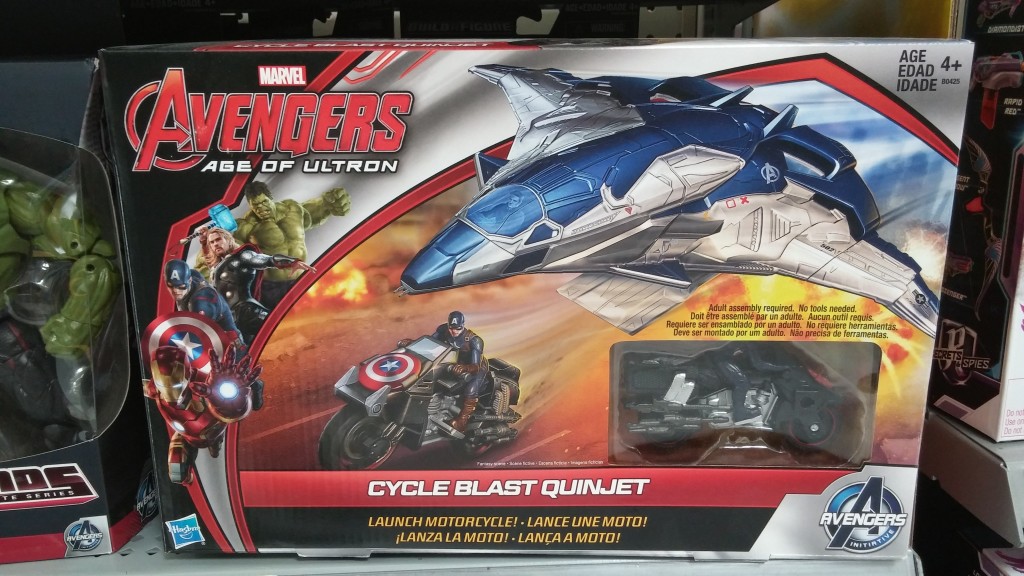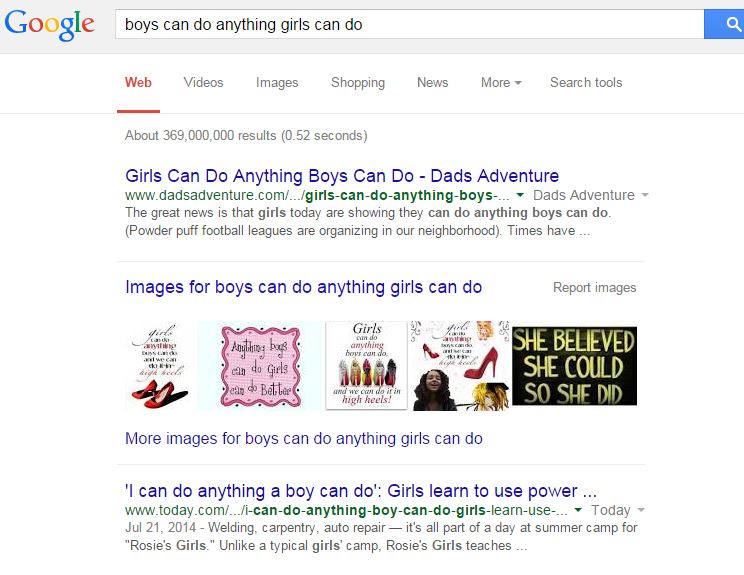I’ve been considering this post for a while, but every time I’ve tried to write it, I get distracted and run off on a tangent. Unlike tax and economics, I have a hard time focusing on cultural debate.
This one, though, seemed like one no one else has address. At least not in a way I like.
So let’s talk sexist kid toys.
The incidents that got my mind working was the Big Hero “4” fabric and the disappearing Black Widow. Some people, including The Hulk, are none too happy that the female superheroes are missing. I hear there’s even been a Twitter campaign to #IncludeTheGirls.
Let’s head over to the local Walmart and see how powerful that hashtag really is:
Nope, still not Black Widow.
As a quick side note, Black Widow isn’t the only Avenger being forgotten. That picture only has four of the big six from the latest film. As my own attempts to collect the Green Arrow has proven, some superheroes, especially those without awesome powers, do not make popular toys.
I do think there’s a problem, though. And I had an epiphany on the cause while watching Sofia the First with my children:
If you’d rather not watch Sofia and her friends dance and sing with crazy frog mouth animation, I totally understand. Let me summarize both the song and the episode. Sofia wants to ride a Pegasus in a royal race, but is told that racing isn’t a girl thing. Sofia decides that girls can do anything, and, in a montage that would make Rocky proud, wins the race despite having the worst horse and only a week of training.
It’s a painfully weak plot that gives kids unrealistic expectations on what it takes to succeed. Why couldn’t she just compete, thus proving girls can do it, then come in third against the boys who have been training their whole lives? Then she can try again next year after putting in real training.
Ah, getting distracted again. Back to the point, even if you haven’t seen this particular episode, you’ve seen something similar. The girls-can-do-anything-boys-can-do trope is required in every children’s show with a significant female audience. Even some non-children’s show, for that matter.
As a father of a very confident daughter, I have no problem with that message. If she loves cars or fights with action figures or play video games or does whatever other thing that has been arbitrarily assigned a “boy” activities, she absolutely should. Let’s continue the good fight on that front.

That’s my girl, on a motorcycle, dressed with a Batman shirt and Superman shoes. She chose her outfit.
As a father of a struggling son, though, I think there’s another message that we’re totally screwing up.
Is there a single “boys can do anything girls can do” movie or show or TV episode? I can’t think of one. Even my Google search assumed I typed it in wrong:
The closest to this message I can find is Doc McStuffins’ dad, who appears to stay at home while his wife works. Even that show, though, (a) never explicitly states as much, (b) has a little boy doing traditional little boy things, and (c) is more heavily watched by girls (at least if the merch sales can be believed. More on that later).
The closest I could come up with men doing traditionally women things in popular culture were examples like the following:
Or for a lighter take:
Heat, if you, like me, are not from the UK, sounds like the British version of Cosmo.
So let me sum up popular culture’s take on the situation: if you’re a woman doing typical man things, you are cool and empowered. If you are a man doing typical woman things, you’re gay.
Why on Earth can’t a three year old boy want a sensible pair of heels just for fun? Is my son not allowed allowed to watch My Little Pony with his sister, or Doc McStuffins, or Sofia the First (which he has called “a pretty good show”) without getting labeled?
At some point, those little boys are going to grow up thinking “well, I’m not gay, so I’m going to have to stop doing these things I’m interested it.”
Now, don’t read more into this than what I’m saying. I’m not trying to make any commentary on being gay. I’m asking why 96.6% of men can’t like things that women traditionally like and/or do without being branded as something they’re not.
I do most of the cooking in our house, a good amount of the cleaning, a decent amount of the child care, and, heck, I even like to be hygienic every now and then. All of these are things that popular culture says, for some perverse reason, are women things. Good husbands and fathers that do these things are often labeled as caring, sensitive, maybe even “in touch with their feminine size.” Yet I think there’s a much better label we should be using:
The norm.
See, while we’ve been spreading this message of girl empowerment, we’ve forgotten to take down the “men must do manly things” message.
What’s worse, we tell these boys throughout their childhood that they must do boy things, then tear them to shreds when they reach adulthood for doing those very things we taught them to do.
But what are “manly things,” anyway? Since women are (rightly) encroaching on many of these typical boy activities, we’re painting boys into an ever shrinking box.
You see it all the time, even in simple things like baby names. I can think of a whole host of boy names that have become girl names. Can you think of any that have swung the other way? I can’t, and Google is no help, again assuming I typed in the wrong question.
Or look back at the toy examples above. In both the Big Hero 6 and the Avengers examples, people are lamenting not being able to buy female superheroes FOR THEIR GIRLS. What about female superheroes for their boys?
Nope. That’s just not done.
You see the same thing in kids clothing. Girl shirts can have Mickey or Minnie, Superman or Wonder Woman, April or the TMNT. Boy shirts only have the character with fictional male genitalia.
This is weird, and I do not believe it is because boys think “Eeeww girls! Yuck!”as the Big Hero 6 fabric maker claimed. Maybe that comes, but not when they’re young, and I doubt that it comes completely on its own.
For example, I clearly remember asking for a My Little Pony toy when I was around 5. Yes, a girl one, though I can’t remember the name. If I remember correctly, my parents even bought it for me. Approximately twenty five years later, our world has progressed so much that it’s still taboo for me to pick up Twilight Sparkle for my son.
Unless, of course, it’s evidence that he’s gay. In which case, it’s some amazing cultural win.
Here’s more anecdotal evidence. Colorado is super dry, so I constantly burn through chapstick (or whatever the brand neutral term is for that lip grease). Combine constantly needing chapstick with constantly losing those stupid little cylinders, and the cost of chapstick shoots up. My habit had always been to pick up the cheapest one in the isle. I didn’t care what the color, flavor, brand, etc. was, as long as it was (a) cheap, (b) works, and (c) doesn’t sparkle.
Then my female cube mate caught me using a gray and purple Blistex. For three weeks (until the Blistex ran out) I was mocked daily for getting such a “girly” product. I really don’t care what she things, but do now buy the more expensive Burt Bees just to shut her up.
Even recently, when a male colleague asked me about my brand of shoes, the women commented how “men can’t talk about shoes!”
Is everyone like that? Of course not. But I’m realizing it’s common enough, maybe even closer to the norm than my own laid back approach to gender segregated products.
For example, regular Suave and Men’s Suave are basically the same crappy product. Unilever didn’t start making the latter to convince men they needed something different, they started making it to capitalize on biases that already existed.
Now, I’m not the kind of person that throws out nature in my calls for equality. Scientifically speaking, boys and girls typically show biological preference towards different types of play, including toys. That doesn’t mean all our boys’ toys have to be hyper masculine, though. It doesn’t mean that we can’t introduce Kara Zor-El into a four year old boy’s DC toy collection. Why can’t we buy the female superheroes for our boys? We certainly buy the Ken dolls for the girls.
And, ultimately, these kinds of problems can’t be solved by Twitter campaigns, because we’re working on the wrong people. It’s not that the companies are creating sexism, they’re just capitalizing on the choices that PARENTS make when purchasing superheroes for their boys. So stop blaming the company for responding to what we’re doing. If we were buying “girl stuff” for our boys (and “boy stuff” for are girls) division lines would disappear all on their own.
Imagine if Hasbro made a Black Widow action figure that sold twice as well as Iron Man. We wouldn’t be having this conversation. Black Widow can be found (try Toys R’ Us), but she’s not flying off the shelves. But instead of telling Hasbro what we want with our wallets, we’re trying to convince Hasbro that they need to make a product that very few people will actually buy just to satisfy our enlightened sensibilities.
Hey, it’s better for them to lose money then us, right? Because it’s okay for us to be self interested with our own money, but not okay for them to be self interested with theirs.
I’m getting distracted again. Anyway, as long as parents (and society) keeps telling our girls they can do anything, but that our boys can only do boy stuff, we’ll continue having these problems. Until we teach our boys that it’s okay to do girl stuff, just teaching our girls to do boy stuff will continue to lead to stupid and meaningless conflict later in life when the boys get jealous that girls are jumping into the boys’ ever shrinking box.
Think I’m wrong? Think I’m rambling? Think anything else vaguely related to the topic? Let me know below.


